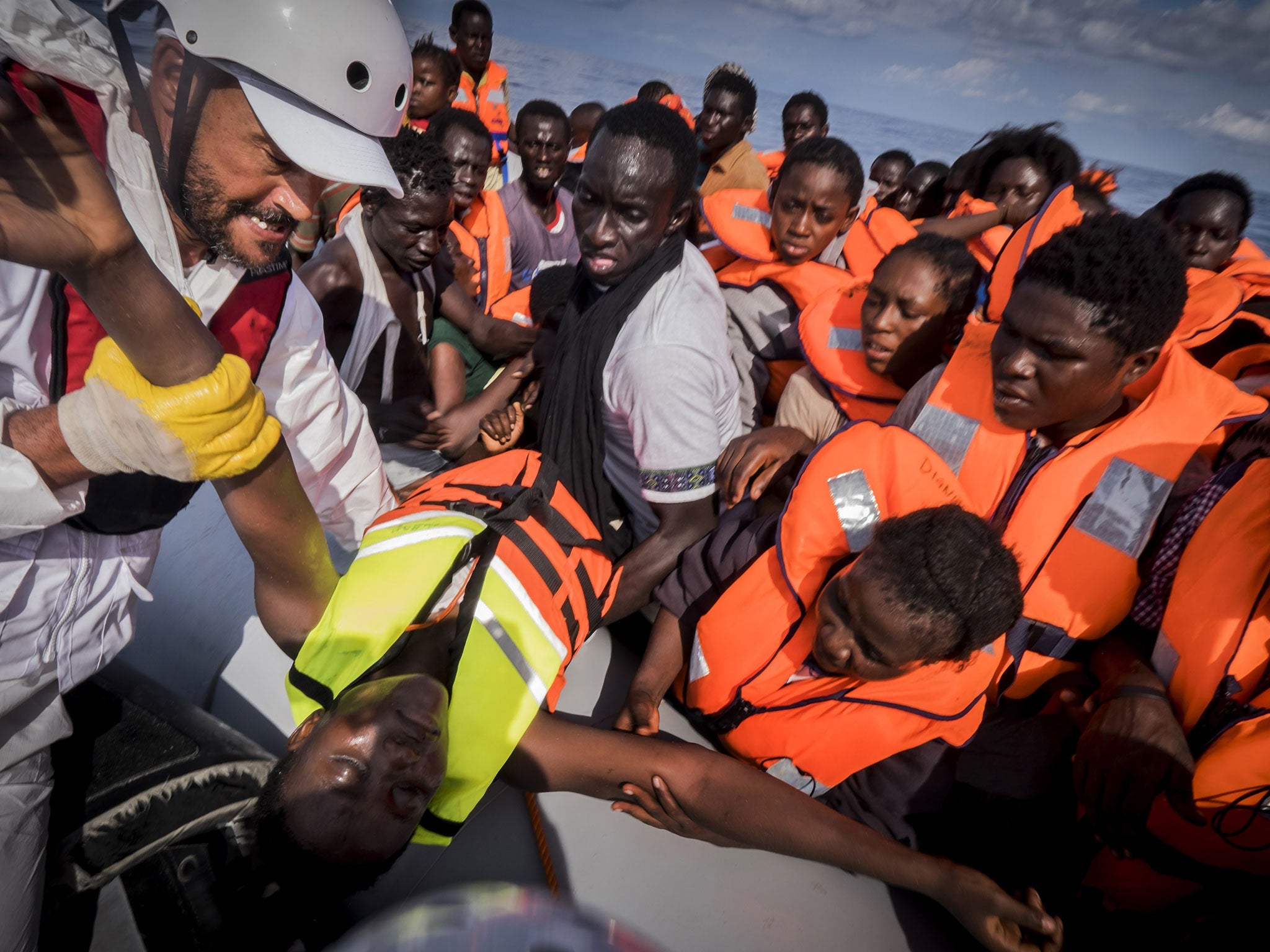More than 20 refugees feared dead after armed men in 'Libyan coastguard vessel' attack migrant boat during rescue
German charity says boat attacked during rescue in Mediterranean Sea

Your support helps us to tell the story
From reproductive rights to climate change to Big Tech, The Independent is on the ground when the story is developing. Whether it's investigating the financials of Elon Musk's pro-Trump PAC or producing our latest documentary, 'The A Word', which shines a light on the American women fighting for reproductive rights, we know how important it is to parse out the facts from the messaging.
At such a critical moment in US history, we need reporters on the ground. Your donation allows us to keep sending journalists to speak to both sides of the story.
The Independent is trusted by Americans across the entire political spectrum. And unlike many other quality news outlets, we choose not to lock Americans out of our reporting and analysis with paywalls. We believe quality journalism should be available to everyone, paid for by those who can afford it.
Your support makes all the difference.More than 20 refugees are feared to have died after armed men attacked an overcrowded dinghy during a rescue operation in the Mediterranean Sea.
Sea-Watch, a German charity, said its rescue ship was deployed to help the vessel by the Italian coastguard after it was spotted 14 nautical miles off the Libyan coast on Friday.
They arrived to find a rubber dinghy packed with 150 migrants and asylum seekers, sending speedboats to give those on board life jackets and help them to safety.
But as the operation continued, a vessel that appeared to be marked with the insignia of Libya’s national coastguard approached, with armed men boarding the migrant boat and attempting to detach its motor.
A spokesperson for Sea-Watch says the men “attacked the refugees, hitting them with clubs”, while preventing the group’s two speedboats from intervening.
“The violent intervention caused a situation of mass panic on board the rubber boat…one tube of the rubber boat collapsed, causing the majority of the 150 people to slip into the water.
“Our crew immediately tried to rescue as many as possible but a number of people could not be saved.”
At least four bodies have been discovered so far, with another four people receiving urgent medical treatment after being pulled from the water unconscious. More than 20 other passengers were missing and feared to have drowned.
“This latest incident of alleged Libyan official units endangered not only the crew of rescue volunteers but moreover caused the death of many migrants,” Sea-Watch said in a statement.
“It is unclear why [what appeared to be the] Libyan Coast Guard engaged the way it did. Sea-Watch calls for an immediate and detailed investigation of this violation of humanitarian law.”
Sea-Watch’s rescue ship remained in operation on Friday and continued to respond to vessels in distress at the direction of Italian authorities.
Britain is among the countries supporting the EU’s anti-smuggling Operation Sofia mission and is training Libyan coastguards and naval personnel in an attempt to stem the number of boats being launched from the country’s shores.
It was not immediately possible to verify whether the attackers were members of Libya’s coastguard or using a stolen vessel, but the incident followed previous accounts of the force intercepting refugees at sea.
Amnesty International said asylum seekers recounted being beaten with wooden clubs and rubber hoses, as well as being shot and tortured at official detention centres back on dry land.
Friday’s assault came after another rescue vessel was attacked by armed men in August.
Médecins Sans Frontières (MSF) said no refugees were on board its ship, the Bourbon Argos, when gunmen opened fire from a speedboat off the coast of Libya.
Rescue workers hid in a designated safe area while the attackers boarded and searched the empty ship for almost an hour on 17 August, with no one harmed.
MSF said it could not identify the group or their motivation, but described them as “professional and well-trained”.
Isis is among a number of armed groups operating in Libya, where a fragile new government is attempting to end a bloody competition for territory between rival militias.
The country’s north-western coast has become the main launching point for migrant boats after instability and lawlessness in the wake of its civil war enabled smuggling gangs to set up a ruthless and profitable trade.
A succession of disasters in waters between Libya and Italy has made the Central Mediterranean the deadliest sea crossing in the world, with several naval and humanitarian ships patrolling the zone in an attempt to prevent sinkings.
More than 3,100 migrants have died on the route this year – drowning or suffocating in overcrowded holds – putting 2016 on course to be the deadliest ever year for refugees trying to reach Europe.
The Independent has attempted to contact the Libyan Embassy and Foreign and Commonwealth Office for comment.
Join our commenting forum
Join thought-provoking conversations, follow other Independent readers and see their replies
Comments